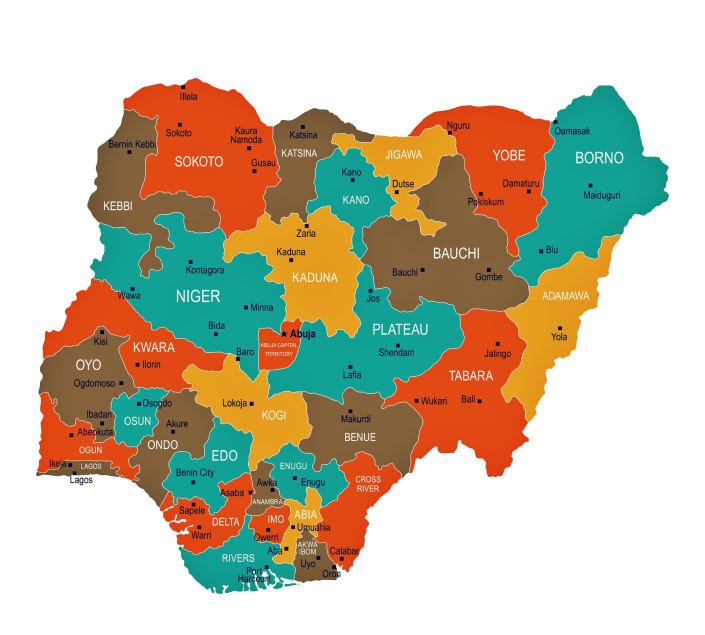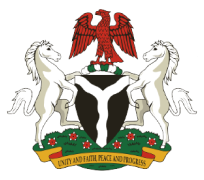Geography
Nigeria is situated in the West African region and lies between longitudes 3 degrees and 14 degrees and latitudes 4 degrees and 14 degrees. It has a land mass of 923,768 sq.km. It is bordered to the north by the Republics of Niger and Tchad; it shares borders to the west with the Republic of Benin, while the Republic of Cameroun shares the eastern borders right down to the shores of the Atlantic Ocean which forms the southern limits of Nigerian Territory. The 800km of coastline confers on the country the potentials of a maritime power. Land is in abundance in Nigeria for agricultural, industrial and commercial activities.
At its widest, Nigeria measures about 1,200 km from east to west and about 1,050 km from north to south. The country's topography ranges from lowlands along the coast and in the lower Niger Valley to high plateaus in the north and mountains along the eastern border. Much of the country is laced with productive rivers. Nigeria's ecology varies from tropical forest in the south to dry savanna in the far north, yielding a diverse mix of plant and animal life.
The broad, mostly level valleys of the Niger and Benue rivers form Nigeria's largest physical region. The Niger enters the country from the northwest, the Benue from the northeast; the two rivers join in Lokoja in the south central region and continue south, where they empty into the Atlantic at the Niger Delta. Together, they form the shape of a Y. Population densities and agricultural development are generally lower in the Niger and Benue valleys than in other areas. North of the Niger Valley are the high plains of Hausaland, an area of relatively level topography averaging about 800 m above sea level, with isolated granite outcroppings. The Jos Plateau, located close to Nigeria's geographic center, rises steeply above the surrounding plains to an average elevation of about 1,300 m. To the northeast, the plains of Hausaland grade into the basin of Lake Chad; the area is characterized by somewhat lower elevations, level terrain, and sandy soils. To the northwest, the high plains descend into the Sokoto lowland.
Southwest of the Niger Valley (on the left side of the Y) lies the comparatively rugged terrain of the Yoruba highlands. Between the highlands and the ocean runs a coastal plain averaging 80 km in width from the border of Benin to the Niger Delta. The delta, which lies at the base of the Y and separates the southwestern coast from the southeastern coast, is 36,000 sq km of low-lying, swampy terrain and multiple channels through which the waters of the great river empty into the ocean. Several of the delta's channels and some of the inshore lagoons can be navigated.
Southeastern coastal Nigeria (to the right of the Y) consists of low sedimentary plains that are essentially an extension of the southwestern coastal plains. In all, the Atlantic coastline extends for 850 km. It is marked by a series of sandbars, backed by lagoons of brackish water that support the growth of mangroves. Large parts of Africa's Bight of Benin and Bight of Biafra fall along the coast. Because of the Guinea Current, which transports and deposits large amounts of sand, the coastline is quite straight and has few good natural harbors. The harbors that do exist must be constantly dredged to remove deposited sand.
Inland from the southeastern coast are progressively higher regions. In some areas, such as the Udi Hills northwest of Enugu, escarpments have been formed by dipping rock strata. Farther east, along Nigeria's border with Cameroon, lie the eastern highlands, made of several distinct ranges and plateaus, including the Mandara Mountains, the Shebeshi Mountains, the Alantika Mountains, and the Mambila Mountains. In the Shebeshi is Dimlang (Vogel Peak), which at 2,042 m is Nigeria's highest point.
Climate
Temperatures across the country is relatively high with a very narrow variation in seasonal and diurnal ranges (22-36t). There are two basic seasons; wet season which lasts from April to October; and the dry season which lasts from November till March. The dry season commences with Harmattan, a dry chilly spell that lasts till February and is associated with lower temperatures, a dusty and hazy atmosphere brought about by the North-Easterly winds blowing from the Arabian peninsular across the Sahara; the second half of the dry season, February - March, is the hottest period of the year when temperatures range from 33 to 38 degrees centigrade. The extremes of the wet season are felt on the southeastern coast where annual rainfall might reach a high of 330cm; while the extremes of the dry season, in aridity and high temperatures, are felt in the north third of the country.
Vegetation
In line with the rainfall distribution, a wetter south and a drier northern half, there are two broad vegetation types: Forests and Savanna. There are three variants of each, running as near parallel bands east to west across the country. Forests Savanna Saline water swamp Guinea Savanna Fresh water swamp Sudan Savanna Tropical (high) evergreen Sahel Savanna Rainforest.
There is also the mountain vegetation of the isolated high plateau regions on the far eastern extremes of the country (Jos, Mambilla, Obudu).
The savanna, especially Guinea and Sudan, are the major grains, grasses, tubers, vegetable and cotton growing regions.
The Tropical evergreen rain forest belt bears timber production and forest development, production of cassava; and plantation growing of fruit trees - citrus, oil palm, cocoa, rubber, among others.



